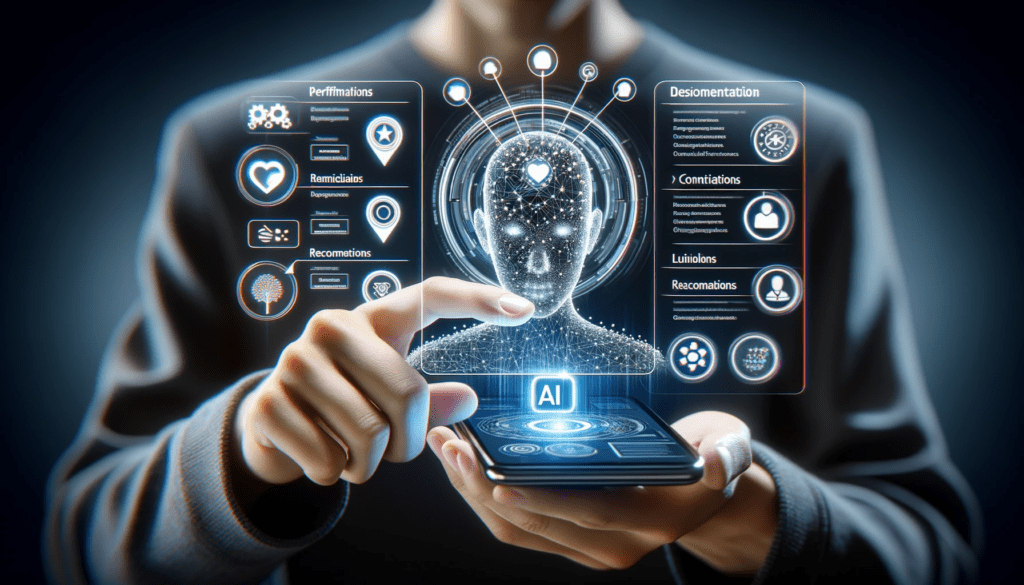In today’s digital age, mobile apps have become an integral part of our lives, serving a multitude of purposes, from communication and entertainment to productivity and convenience. However, not all mobile app experiences are created equal. Users now expect personalized and tailored interactions that cater to their unique preferences and needs. This shift in user expectations has been made possible through the transformative power of artificial intelligence (AI).
AI has emerged as a driving force behind the evolution of personalized user experiences in mobile apps. With its ability to analyze vast amounts of data and understand user behavior, AI is reshaping the way we interact with our favorite apps. In this article, we will delve into the fascinating world of AI-driven personalization in mobile apps and explore how it is revolutionizing the way we engage with digital content and services.

The Power of AI in Understanding User Behavior
At the heart of AI-driven personalization in mobile apps lies the ability to understand and interpret user behavior. AI algorithms are designed to collect, analyze, and draw insights from user data, creating a comprehensive picture of each individual’s preferences and habits.
Through the continuous monitoring of user interactions, AI can discern patterns, such as the type of content a user consumes, the features they frequently utilize, and the times they are most active within the app. These insights are invaluable for app developers and businesses seeking to offer tailored experiences.
However, it’s essential to acknowledge the ethical considerations surrounding data collection and user privacy. Striking the right balance between personalized experiences and respecting user data rights is a challenge that the industry continues to address.
Customized Content Delivery
One of the most noticeable ways AI is transforming the user experience in mobile apps is through customized content delivery. Apps across various categories, including news, entertainment, and e-commerce, leverage AI to curate content based on individual interests and behaviors.
Imagine opening a news app that presents headlines and articles aligned with your preferred topics, or using a streaming service that suggests movies and music based on your past selections. These are just a few examples of how AI tailors content to cater to individual tastes.
The benefits of customized content delivery are multifold. Users are more likely to engage with and spend more time on apps that consistently offer content that aligns with their interests. This increased engagement often leads to improved user retention and overall satisfaction.
However, as AI-powered content personalization advances, questions surrounding the potential creation of “filter bubbles” or echo chambers arise. These terms refer to the risk of users being exposed only to information and viewpoints that reinforce their existing beliefs, potentially limiting their exposure to diverse perspectives.
In summary, AI-driven customized content delivery is a prominent feature in modern mobile apps, enhancing user engagement and satisfaction while prompting discussions about the balance between personalization and the broader information landscape.
Enhanced User Interface and Navigation
Beyond content personalization, AI is reshaping the user interface (UI) and navigation within mobile apps. AI algorithms can analyze user interactions and provide valuable insights on how to optimize app layouts and designs. This means that UI elements can be reorganized, resized, or repositioned to suit individual user preferences.
For instance, an e-commerce app might rearrange product categories based on the user’s browsing history or place frequently used features within easy reach. Navigation menus can be adapted to prioritize sections or actions that align with the user’s typical behavior within the app.
Additionally, AI can assist users in finding content or features more efficiently through intelligent search and recommendation systems. This can lead to a more intuitive and enjoyable app experience, ultimately increasing user satisfaction.
Predictive and Proactive Features
AI-driven personalized experiences extend to predictive and proactive features within mobile apps. AI algorithms can anticipate user needs and take actions on their behalf, simplifying tasks and enhancing convenience.
For example, a smart calendar app might use AI to predict meeting times based on historical data and suggest optimal scheduling options. Similarly, virtual assistants like Siri or Google Assistant can offer proactive reminders, such as notifying users about upcoming appointments or suggesting routes to avoid traffic during their commute.
These predictive and proactive features not only save users time and effort but also contribute to a sense of personalization and attentiveness within the app.

Personalized Notifications and Alerts
AI’s impact on personalized user experiences extends to notifications and alerts. Mobile apps leverage AI algorithms to tailor the timing and content of notifications to individual preferences and habits.
For instance, a news app might send breaking news alerts at times when the user is most likely to engage with them based on their past behavior. Similarly, e-commerce apps can send personalized offers and promotions when the user is most active and likely to make a purchase.
Personalized notifications not only improve user engagement but also reduce the likelihood of users disabling or ignoring notifications due to irrelevance. This fine-tuned approach to notifications helps apps maintain a valuable presence on users’ devices.
Challenges and Considerations
While AI-driven personalized user experiences in mobile apps offer numerous advantages, there are important challenges and considerations to address:
- Data Privacy: Collecting and analyzing user data to provide personalization must be done responsibly and in compliance with privacy regulations. Users should have control over their data and be informed about how it is used.
- Bias and Fairness: AI algorithms may inadvertently introduce biases into recommendations and personalization. Developers must actively work to mitigate bias and ensure fairness in the user experience.
- User Control: Balancing personalization with user control is crucial. Users should have the ability to adjust personalization settings and opt-out if desired.
- Transparency: Mobile apps should be transparent about their use of AI and data collection. Clear communication with users builds trust and encourages them to embrace personalized experiences.
In conclusion, AI is revolutionizing the way we experience mobile apps by providing personalized, intuitive, and anticipatory interactions. However, responsible development and a commitment to user privacy and fairness are essential to harness the full potential of AI-driven personalization in the mobile app ecosystem.
